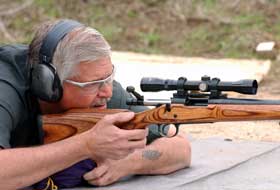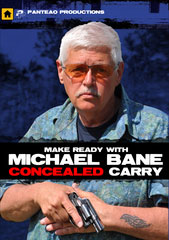Hanging Together in the District
Across the internet discussion boards and various news outlets, there is a generally screech of indignation and betrayal going up over the Justice Department’s filing in regards to the case of The District of Columbia versus Dick Anthony Heller.
If you’ve been in suspended animation or something for the past few months, here’s the skinny: Dick Heller (and others) sued the District of Columbia, challenging the district’s 30-year old firearms restrictions. The Heller argument: the Second Amendment of the Constitution of the United States says there shall be no infringement upon the right of a citizen to keep and bear arms. In other words, the District’s gun ban- that has been held up as the standard in many other instances of case law, is unconstitutional because it deprives a law-abiding citizen of the right to self-protection in the form of a firearm.
The indignant screams come following the Amicus Curiae (friend of the court) brief field by Stephen R. Rubenstein, Chief Counsel of the Bureau of Alcohol, Tobacco, Firearms and Explosives, and Paul D. Clement (et al) the Solicitor General and Counsel of Record for the Department of Justice.
In this filing, the Department of Justice tries, as is the habit of the ATF and other bureaucratic organizations, to have it both ways. On one hand, it talks about the fundamental right of the Second Amendment. In a later statement, the case is made that the District of Columbia’s ban should, if not upheld by the Supreme Court, form the base upon which “reasonable restrictions” could be based.
The reasoning? The Justice Department has used the ban as the basis of cases it has argued in the past. In other words, it may have been wrong, but we used it as a reference, and that should be good enough to set the groundwork for “reasonable restrictions” on gun ownership.
Further, the filing argues, the respondent did not claim a “legal right to carry a handgun outside his home” so the court was not required to “consider the more difficult issue whether the District can ban the carrying of handguns in public, or in automobiles.”
The brief also argues that the Court of Appeals accepted, at least superficially, that the district had the right to require that privately-owned firearms be registered, despite the finding that the ban itself was unconstitutional.
The reasoning? Incorrect standards were applied by the lower court. Today’s standards, should be “interpreted in the light of context and history”.
>From my chair, those are fighting words. “in the light of context and history” is the phrase most commonly read when activist jurists are legislating from the bench and basically tossing out the canons of law for the rubber-ruler of “modern standards.”
As General Norman Schwarzkopf once asked “what is it about the word NO that you don’t understand?” Not infringe should mean exactly that. The attempt to outlaw guns in the hopes that eventually the supply of guns will dry up and eliminate the gun problem isn’t just intellectually bankrupt; it’s also the kind of lazy legislation and law enforcement that leads to bad laws. The majority of bad laws on the books today are the result of trying to apply a broad-brush approach to a narrow situation. The law’s don’t fit and create more problems than they cure.
Bluntly put, passing legislation that transforms otherwise law-abiding citizens into criminals isn’t just lazy, it’s stupid. After all, it has been proven throughout history that the only people impacted by bans are the people to whom the law has meaning. Criminals are not deterred by rules, they are deterred by law enforcement AND a citizenry that will not allow itself to be victimized. When a criminal sees someone capable of self-defense, they generally look for someone else to victimize.
So, the Justice Department argues for the District of Columbia’s gun ban. In their minds, I’m certain they have no other option. After all, what they categorize as “categorically” precluding any sort of ban calls other issues into question. Among them, the federal bans on ownership of certain firearms (read that as machinguns and AOWs – or “any other weapons” the ATF’s catch-all phrase for a variety of hard-to-categorize arms
In other words, the Justice Department feels the District of Columbia’s ban should be upheld –simply to prevent existing federal statutes from being examined.
Three key points are raised in the argument:
1. Congress Has Authority To Prohibit Particular Types Of Firearms, Such As Machineguns;
2. Congress Has Substantial Authority To Ban The Private Possession Of Firearms By Persons Whom Congress Deems Unfit To Keep Such Weapons;
3. Congress Has Authority To Regulate The Manufacture, Sale, And Flow Of Firearms In Commerce.
Based on those three arguments, the Justice Department recommends the Supreme Court “remand the case to the lower courts to permit them to analyze the constitutionality of the D.C. Laws at issue under the proper constitutional inquiry.” In other words, it would please the Justice Department and the ATF if the Supreme Court simply pushed the whole matter back at the lower court with the instruction to “check this over again and see if you can’t find another way to interpret the Second Amendment so we can keep the gun bans in effect in the District of Columbia.”
If the Supreme Court says not, the friend of the court brief warns, other fundamental regulations (like those under which the ATF largely exists) could be called into question.
That, in the eyes of politicians and bureaucrats, might not be a good thing, but their lofty conclusion says it far better than I:
“The Court should affirm that the Second Amendment, no less than other provisions of the Bill of Rights, secures an individual right, and should clarify that the
right is subject to the more flexible standard of review described above.”
This isn’t a case of the Bush Administration selling out, despite the fact that others – more erudite than I – have said it is. It is a case of bureaucrats selling out the law for some job security.
I may be a cynic, but I couldn’t imagine them acting otherwise. To do so would help make the case that a lot of what they spend their time doing at the ATF, including hassling legitimate businesses over clerical errors, really doesn’t have much to do with either law – or enforcement.
--Jim Shepherd
Monday, January 14, 2008
THE SELL-OUT...from the SHOOTING WIRE
From the ever-intelliget Jim Shepherd at the SHOOTING WIRE:
Subscribe to:
Post Comments (Atom)






11 comments:
My plan is to take the cover page of their brief and send it along with comments written in a red Sharpie to both Paul Clement and George Bush. I doubt they'll get the message but at least if enough of us do this, we can clog their mail system. AS to what to say, that is up to each individual and I will not say you should be respectful....as they obviously do not deserve our respect. john
The issue could not have been described better than has been done here!!!!
This is the knd of statement that the NRA should have made.
The July 2007 edition of the "Blue Press", contained a profound editorial by Peter Caroline. It too was titled "Hanging Together", just as this very profound blog entry is. Mr. Caroline headed his disertaion with a quote that sums it all up. It was as follows:
"We must all hang together, or assuredly we shall all hang separately." Benjamin Franklin
July 4, 1776
Where are the Republican candidates on this issue? Why not put some pressure on these guys to take a stand?
Ahem...
The only Republican candidate who would do a better job - and a much better job at that - that the current administration is:
FRED THOMPSON.
McCain, Giuliani, Romney - all are suspect.
Huckabee talks a good talk and has a good record with guns... but he also has a record as a big government nanny stater (for instance, he wants a nationwide ban on tobacco) that just screams out potential gun control. He also reaches out for support from liberals on a lot of issues. Would Huckabee end up just another GWB who says one thing but does another on guns?
We need Fred, people. No more fooling around. No more wasting talk on crap like "fire in the belly" or "does he want the job?" Anyone who is running for President when he could be earning millions in showbiz clearly wants the job. And anyone who saw Fred rip into Huck on conservative principles in the recent debate knows Fred has the fire in his belly.
No more hemming and hawing. Gun owners need to get on the Fred bandwagon and FAST, otherwise we are guaranteed a President who at best is another wishy washy GWB and at worst a Hillary/Obama gun grabbing fiend.
I've spent years defending this bastard president and now he gives me and millions of other gun owners the middle finger. Short of Fred being nominated, I think I might just sit out elections from now on. The case for not voting seems more compelling with each additional year I live.
I'm so confused... I always thought that "infringe" and "restrict" were basically synonyms. Now I guess the SC has a way to rule that "reasonable restrictions" aren't actually "infringements".
I guess I have some re-education in my future. :-0
DOJ Brief in DC Gun Case Distorts the Truth About Machine Guns
In 1939, the Federal government perpetrated a fraud upon the Supreme Court, and it led to bad law that undermined the Second Amendment. Last week, they did it again.
In 1939 in US v. Miller, the Supreme Court ruled that because there was no evidence that a short-barreled shotgun had any relation to militia use, it was not protected under the Second Amendment. A Department of Justice brief claimed that short-barreled shotguns weren’t used by the military, when in fact they were. But because defendant Miller had disappeared and was unrepresented by counsel, this fraud went unchallenged, and became the foundation for the Miller decision.
Now, the Bush Department of Justice (DOJ) has filed a brief with the Supreme Court in the District of Columbia v. Heller case, which overturned the DC handgun ban. The DOJ brief perpetrates another critical misconception in an apparent attempt to protect a questionable federal machine gun ban from Constitutional challenge.
Since 1934, machine guns have been heavily restricted, requiring purchasers to submit to a rigorous background check including fingerprints and a $200 tax. Since 1934, about 100,000 machine guns have passed lawfully into civilian hands by this strict procedure, which no one is proposing to repeal, even though it was upheld only by the Constitutionally shaky Miller decision.
In 1986, a new federal law banned any more machine guns from ever reaching the hands of ordinary, law-abiding citizens. That meant that the existing collection of about 100,000 privately-owned machine guns would be the only ones ever to be lawfully possessed. That’s well less than one machine gun for every thousand American gun owners.
Under the 1986 federal machine gun ban, ordinary people will never again own modern rifles of the type normally carried by troops in the “standing army.” Over the generations, this collection of 100,000 legally “grandfathered” machine guns is becoming worn from use, and functionally obsolete as firearms technology advances. Because of their scarcity, these arms find their way into the hands of wealthy collectors and museums, escalating their market price to extraordinary levels at least ten times what they would be without the ban, compared to modern semi-auto equivalents.
The recent DOJ brief in Heller seeks to preserve this 1986 federal machine gun ban through the back door, even though the issue has not been litigated, and is irrelevant to the question before the court.
In the Heller opinion, the Court of Appeals ruled that banning one whole category of arms (pistols) was as impermissible as banning all firearms. The opinion pointed out that a government could ban all guns, and argue that one still had the right to keep and bear some “arms” if one could still lawfully own a saber. The DOJ brief worries that this prohibition on banning whole categories of arms would be extended to overturn the 1986 machine gun ban.
The DOJ’s brief justifies its fears of machine guns in the hands of law-abiding citizens only by unsupported references to “particularly dangerous types of firearms,” and “types of firearms that are particularly susceptible to misuse.” It raises the issue of whether a type of firearm “poses specific dangers.” The brief states that the federal machine gun ban is “carefully targeted to firearms that have little or no legitimate private purpose,” and that “the government’s interest in regulating firearms like the machine gun to protect the public safety is paramount.”
The apparent fear of the Bush DOJ is that we return to the 52-year era from 1934-1986 when any law-abiding citizen that passed a rigorous background check could purchase a new machine gun from any manufacturer willing to sell to him.
So, just how dangerous was that era? The DOJ brief doesn’t offer a shred of evidence that any lawfully-owned machine guns were misused, or ever endangered public safety. The reality is that during the 52-year period before the 1986 machine gun ban (when hundreds of thousands of conventional firearms homicides occurred) there were exactly zero homicides committed using these registered machine guns. Zero.
The DOJ brief perpetrates the misconception that lawfully-owned machine guns are a danger, when in fact they represent by far the safest category of firearms and owners. It would be a grave error if the Justices were to be misled by the false fears raised by the DOJ brief, and extended their ruling on the DC handgun ban to prop up the Constitutionally questionable 1986 federal machine gun ban.
The Constitutionality of the federal machine gun ban is in serious doubt because it bans from private hands the arms most relevant to militia service, and it undermines the benefit of an armed citizenry as a bulwark against a standing army. But the Court should limit its ruling to the case before it, and not be goaded by the DOJ to inject improper dicta about a Constitutional question that deserves to be addressed only after a proper hearing of the evidence.
In Miller, the Court ruled in the absence of proper evidence and generated questionable law. That mistake must not be repeated.
It can't truly work, I believe like this.
Oh my god, there's a great deal of useful material in this post!
Post a Comment